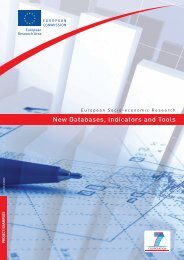Euratom FP6 Research Projects and Training Activities Volume III
Euratom FP6 Research Projects and Training Activities Volume III
Euratom FP6 Research Projects and Training Activities Volume III
Create successful ePaper yourself
Turn your PDF publications into a flip-book with our unique Google optimized e-Paper software.
Introduction<br />
This brochure describes the third batch of<br />
research projects funded by the specific<br />
programme for ‘<strong>Research</strong> <strong>and</strong> <strong>Training</strong> on<br />
Nuclear Energy (2002-2006)’ under the Sixth<br />
<strong>Euratom</strong> Framework Programme for Nuclear<br />
<strong>Research</strong> <strong>and</strong> <strong>Training</strong> <strong>Activities</strong> (<strong>FP6</strong>). The<br />
projects described here all involve research<br />
activities in the general area of nuclear fission,<br />
including the management of nuclear waste,<br />
radiation protection, <strong>and</strong> other activities in<br />
the field of nuclear technologies <strong>and</strong> safety,<br />
such as innovative concepts, education <strong>and</strong><br />
training, <strong>and</strong> the safety of existing nuclear<br />
installations. <strong>Euratom</strong> activities on research<br />
<strong>and</strong> development for nuclear fusion are not<br />
covered here.<br />
One-third of the electricity consumed in the enlarged EU is<br />
generated by nuclear (fission) power. Over the next 50 years,<br />
world energy dem<strong>and</strong> is set to increase rapidly: global<br />
energy use will at least double, with electricity dem<strong>and</strong><br />
growing fastest <strong>and</strong> new energy carriers, such as hydrogen,<br />
entering the market. As an indigenous <strong>and</strong> dependable<br />
source of energy, nuclear power can contribute to the EU’s<br />
independence <strong>and</strong> security of future energy supply. More<br />
advanced reactor technology promises significant improvements<br />
in the efficiency <strong>and</strong> sustainability of nuclear power<br />
production whilst, at the same time, ensuring even higher<br />
st<strong>and</strong>ards of safety <strong>and</strong> producing less waste.<br />
Moreover, in the context of increasing evidence of climate<br />
change, <strong>and</strong> a consequent need to reduce fossil fuel use,<br />
nuclear power is the only carbon-free technology currently<br />
available to advanced societies that is able to provide baseload<br />
electricity supply 24 hours a day, seven days a week.<br />
This brochure is being published at a time when energy in<br />
general <strong>and</strong> nuclear energy in particular are in the political<br />
INTRODUCTION<br />
spotlight. In this context, research in nuclear science <strong>and</strong><br />
technology, including that coordinated <strong>and</strong> financed<br />
through the <strong>Euratom</strong> Framework Programme, is taking on an<br />
enhanced significance. Initiatives such as the Strategic Energy<br />
Technology Plan, whose establishment was endorsed at the<br />
European Council summit in March 2007, <strong>and</strong> the imminent<br />
creation of a technology platform in sustainable nuclear<br />
energy, are extremely significant developments.<br />
Addressing societal concerns,<br />
protecting the public<br />
However, there are a number of important concerns that<br />
affect the future use of nuclear power in Europe. The<br />
primary issues are operational reactor safety <strong>and</strong> the<br />
management of long-lived radioactive waste. Protection<br />
of society <strong>and</strong> the environment is paramount in all<br />
decisions relating to nuclear activities – including the use<br />
of radiation in medical applications. To ensure a continued<br />
high level of safety for society, nuclear technology<br />
dem<strong>and</strong>s the use of ‘state-of-the-art’ techniques requiring<br />
a continual supply of highly trained <strong>and</strong> dedicated people.<br />
<strong>Research</strong> plays an essential role in this process.<br />
The European dimension to these issues is evident. The<br />
safety of nuclear reactors is an important issue for all countries,<br />
whether or not they themselves operate nuclear<br />
power plants. All countries produce radioactive wastes or,<br />
through the grid, import electricity from nuclear production<br />
in other countries. All hospitals use radioactive substances<br />
in various diagnosis <strong>and</strong> treatment technologies;<br />
research reactors operate in many countries; universities<br />
use radioactive isotopes in vital research in chemistry,<br />
biology <strong>and</strong> engineering; <strong>and</strong> many industrial activities<br />
also use sources of ionising radiation.<br />
All waste is safely managed. The low-hazard waste is already<br />
disposed of on the industrial scale. In the case of the smaller<br />
volume of the most hazardous waste, principally originating<br />
from nuclear power reactors, the continuing R&D effort is<br />
making tremendous progress towards reversible disposal in<br />
deep geological repositories. Various host rocks have been<br />
evaluated <strong>and</strong> assessments made of the ability of such systems<br />
to isolate this high-level waste from the surface environment<br />
for the required timescales (10 000 years +). In<br />
addition, innovative techniques such as partitioning <strong>and</strong><br />
transmutation could reduce the long-term radiotoxicity of<br />
this waste, thereby minimising the timescale required for<br />
5



